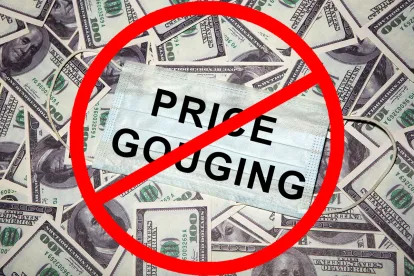Price gouging enforcement and litigation is front and center for company counsel and business managers nationwide. Our weekly round up highlights some of the most relevant news and information to our clients and friends.
Man Sentenced for Fraud in Connection Federal Charges Stemming from Price Gouging and Non-existent Face Masks
On February 2, 2021, a Georgia man pled guilty to Conspiracy to Commit Wire Fraud after admitting he attempted to sell 50 million non-existent face masks. The man was prepared to broker a $317 million sale to an unnamed foreign government in exchange for a portion of the profits. This price is more than 500% higher than the market value for masks. The United States Secret Service intercepted the wired money to the foreign government before the purchase was completed. The man has been fined $1,500, sentenced to home confinement for five months and 29 days, and ordered to serve three years of probation.
Delaware Introduces Price Gouging Legislation
On January 28, 2021, Delaware Representative David Bentz and Senator Trey Paradee introduced House Bill 91, which aims to “empower the Attorney General to intervene against unfair business practices.” House Bill 91 would amend the Consumer Fraud Act to explicitly ban unfair or unconscionable business practices and make price gouging illegal. Currently, price gouging is prohibited under Governor John Carney’s emergency declaration, but Delaware is among the minority of states without a permanent law on the books. House Bill 91 seeks to prohibit unfair practices that are not “readily or easily addressed” by current law, defining unfair practices as practices which may be construed as: (1) offensive to established public policy; (2) unethical, oppressive, or unscrupulous; or (3) substantially injurious to consumers. According to the bill synopsis, “[p]rohibiting unfair practices will … protect consumers [from] … price gouging during a state or national emergency.”
Delaware Governor Strengthens Price Gouging Prohibition via Executive Order
On February 4, 2021, Governor John Carney of Delaware issued the sixth modification to his Omnibus State of Emergency Declaration, strengthening Delaware’s prohibition on price gouging. The Executive Order provides that “new market entrants are not exempt from the prohibition on price gouging during the State of Emergency.” While Delaware does not currently have a price gouging law, the Governor’s March 12, 2020 state of emergency declaration stated that “[n]o entity doing business in this state shall engage in price gouging as a result of this public health emergency, which shall mean an excessive price increase of goods or services offered for sale beyond the sale price in the usual course of business immediately prior to the date of this state of emergency, unless the increase is attributable to additional costs imposed on the supplier of such goods or services, such price not to increase more than 10% from the cost customarily applied in the usual course of business prior to this state of emergency.” Like many states with price gouging laws, the original executive order did not address new sellers entering the marketplace. Governor Carney’s new executive order closes this potential loophole that many state price gouging laws fail to address.
Idaho Lawmakers Support Bill to Amend Price Gouging Law
On February 2, 2021, Idaho senators voiced support for Bill S1041, which would amend Idaho’s price gouging statute to prohibit exorbitant or excessive price increases during a state of emergency. This is in comparison to Idaho’s current law, which prohibits exorbitant or excessive prices, regardless of whether those prices increased or decreased. Although the bill received bipartisan support, the Idaho Attorney General’s Office opposes the bill, stating that the bill will make price gouging easier. According to Deputy Attorney General Brett DeLande, “[i]n the middle of a pandemic why would the Legislature want to make it easier to price gouge?” The bill comes after three of Idaho’s largest fuel retailers settled a price gouging investigation in 2020 for a combined $1.5 million. Read our blog post on the settlement.




 />i
/>i
